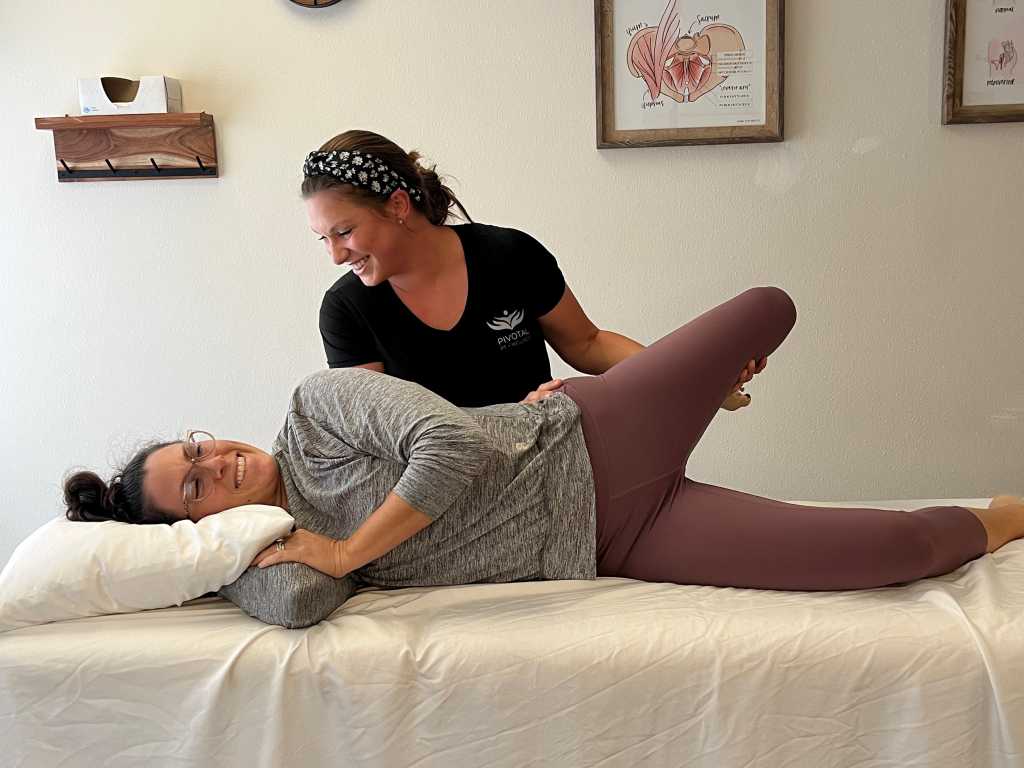Disclosure :: this post is sponsored by Pivotal PT & Wellness and written by Dr. Emily McElrath. Want to know WHY pelvic floor therapy is worth investing in? Read more HERE.
Speculums, Stirrups, and Sex – Oh My! :: Why Pelvic Floor Physical Therapy Doesn’t have To Be Scary
This Ain’t Ya Mama’s Pelvic Exam
Before you think, “pelvic PT sounds absolutely scary….or at the very least intimidating,” hear us out. We are mothers and pelvic experts. We promise not to belittle anyone’s concerns, BUT we want to dispel myths and ease common fears about pelvic floor physical therapy.
- Pelvic PTs do not use a speculum: While traditional pelvic exams at an OB/GYN’s office use a speculum, pelvic exams with trained PTs do not require this part of the pelvic exam because we aren’t trying to visualize and/or assess your cervix. While we may in fact be able to palpate it on exam, the cervix is not our primary interest. What will be assessed is the external vulvar and perineal tissues, the internal muscles of the pelvic floor and how well you can control those muscles. We will gently palpate these areas as you perform certain movements (kegel, relax, and bear down) and then treat any areas of tension we may find. The best part is that we only need one finger to do this. There is no scary speculum, and there is typically no discomfort for those who may struggle with pelvic pain. It is also important to note that the internal exam does not HAVE to happen, especially on the first visit. While it can provide the therapist with useful information, it can be postponed until the patient feels comfortable. This is especially important for patients who may have experienced trauma, and/or have severe tension and pelvic pain.
- Pelvic PTs do not use stirrups: Unlike traditional pelvic exams, pelvic PT sessions NEVER involve stirrups. Pelvic PT sessions are typically much more laid back than traditional pelvic exams, and the patient’s comfort is of the utmost importance. This is not designed to be a cold clinical experience. More specifically, our clinic is designed to feel akin to a spa and the opposite of a medical facility. And again, we don’t have to be all up in your business as it can sometimes feel with traditional OB/GYN exams. Well okay, we are sort of in your business, but we do not need you displayed in stirrups.
- Pelvic PT is not only about sex: While it’s true that we do assess and address sexual function in our sessions, that is not the ONLY thing we are looking at. In traditional OB/GYN exams, the pelvic floor and its surrounding tissues are primarily considered a reproductive and sexual organ. While there are subspecialties like urogynecology, by and large the OB/GYN is performing a routine Pap smear, assessing sexual function, and ensuring that you have a safe and healthy pregnancy and delivery. They do not typically address muscular function of these tissues, how they support and interact with the SI joint and low back, or how they relate to urinary and bowel function (again, there are subspecialties for that). This is where pelvic PT really shines! We look at everything from your head to your toes, and in a 360 degree fashion. We are assessing all of the following to ensure we are addressing any causative factors of your symptoms:
- How you breathe: Fun fact, the diaphragm and pelvic floor need to move in sync with breathing.
- How your upper body moves in relation to your lower body, and whether or not there are muscle imbalances that may be occurring.
- How the connective tissues of your abdomen, trunk, pelvis, and upper legs move and whether or not there is tissue restriction there.
- How your vulvar tissues look. This can clue us in to any potential hormonal imbalances, potential immune or inflammatory conditions, and how any scar tissue from delivery may be impacting the mobility of the tissues.
- How your vulvar tissues feel. Are they more sensitive to touch than normal? Is the tissue more frail or dry than it should be?
- How the muscles of your pelvic floor feel and move. This is the internal portion of the exam, where we gently palpate all the muscles of the superficial and deep layers of the pelvic floor. We are looking for any areas of tension, scar tissue from delivery or prior gynecological procedures, and how well these muscles move. We will assess whether or not you can properly kegel (contract), relax, and gently bear down (like you would to poop or birth a baby). This last part is important as it provides us with information about bladder and bowel function.
 See? Pelvic Floor Physical Therapy is Not So Bad!
See? Pelvic Floor Physical Therapy is Not So Bad!
So as you can see, it’s about SO much more than just sexual function for us Pelvic PTs! We want to improve your quality of life across ALL aspects of daily living. And while we empathize with the fact that these appointments can be intimidating and very personal, we hope our prospective patients realize that they don’t have to be scary. But if you’d like more nitty gritty info on who to expect from your first pelvic floor PT appointment, you can find that here.
Lastly, we know first hand the intimacy of these appointments as our training requires us to be both “the patient” and therapist. Every examination and treatment technique that we perform, we have also had performed on us. Additionally, both myself and my business partner have been pelvic PT patients. We have experienced postpartum challenges that affected multiple aspects of our daily lives; in short, we are just like you. As such, we approach each appointment with a level of compassion that we hope makes all our patients feel safe, validated, and well cared for.
How To Find A Local to New Orleans & Northshore Pelvic PT
If you’re looking for personalized healthcare, with compassionate therapists, and not-so -scary examinations … we’d be honored to be part of that healthcare journey! If you’re on the Northshore, our Mandeville Clinic is open and accepting new patients. Our Southshore location (Lakeview) will be opening November 1st, 2023, but the schedule is already open for booking. If you’d like to schedule at either of our locations, please do so here.
If you feel you would benefit from pelvic floor physical therapy, please give us a call at (504) 358-0560. We would love to help! Please find info about our therapists, pricing, and scheduling via our website listed here (www.pivotalptandwellness.com).
Emily McElrath, PT, DPT, MTC, CIDN
Emily is a native of New Orleans and received her undergraduate Bachelor’s degree in  Athletic Training at the University of Southern Mississippi. She then went on to attain her Doctorate of Physical Therapy at the University of St. Augustine in St. Augustine, FL. Emily is a former collegiate runner, turned Crossfitter who has a passion for helping people optimize performance. She is highly trained in Sports/Orthopedics and Pelvic Floor Physical Therapy, and has first hand experience modifying HIIT exercises for the pregnant and postpartum athlete to ensure they are able to continue their desired activity injury free. Emily is certified in manual therapy and dry needling, which allows her to provide a wide range of treatment skills including joint and soft tissue mobilization. Emily is also an instructor for Herman & Wallace Pelvic Rehab, and enjoys teaching fellow PTs about pelvic floor physical therapy. While not working, Emily enjoys time with her husband and two kids,
Athletic Training at the University of Southern Mississippi. She then went on to attain her Doctorate of Physical Therapy at the University of St. Augustine in St. Augustine, FL. Emily is a former collegiate runner, turned Crossfitter who has a passion for helping people optimize performance. She is highly trained in Sports/Orthopedics and Pelvic Floor Physical Therapy, and has first hand experience modifying HIIT exercises for the pregnant and postpartum athlete to ensure they are able to continue their desired activity injury free. Emily is certified in manual therapy and dry needling, which allows her to provide a wide range of treatment skills including joint and soft tissue mobilization. Emily is also an instructor for Herman & Wallace Pelvic Rehab, and enjoys teaching fellow PTs about pelvic floor physical therapy. While not working, Emily enjoys time with her husband and two kids,
















